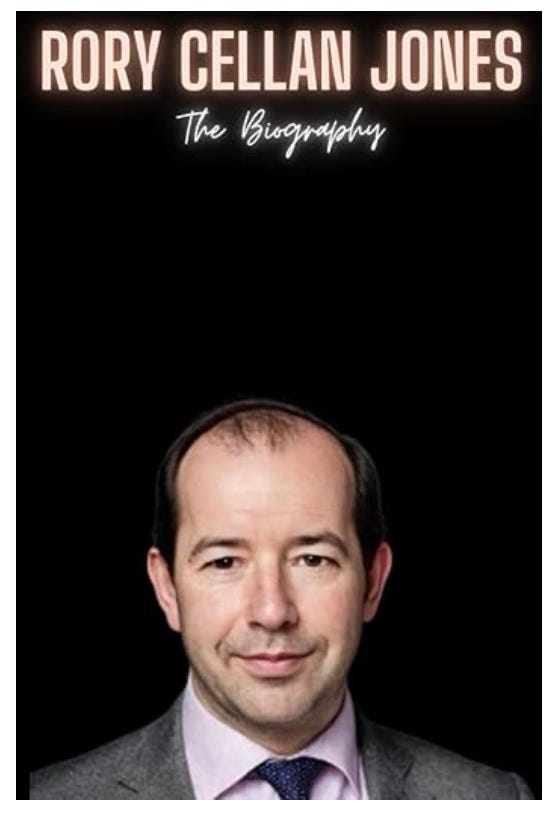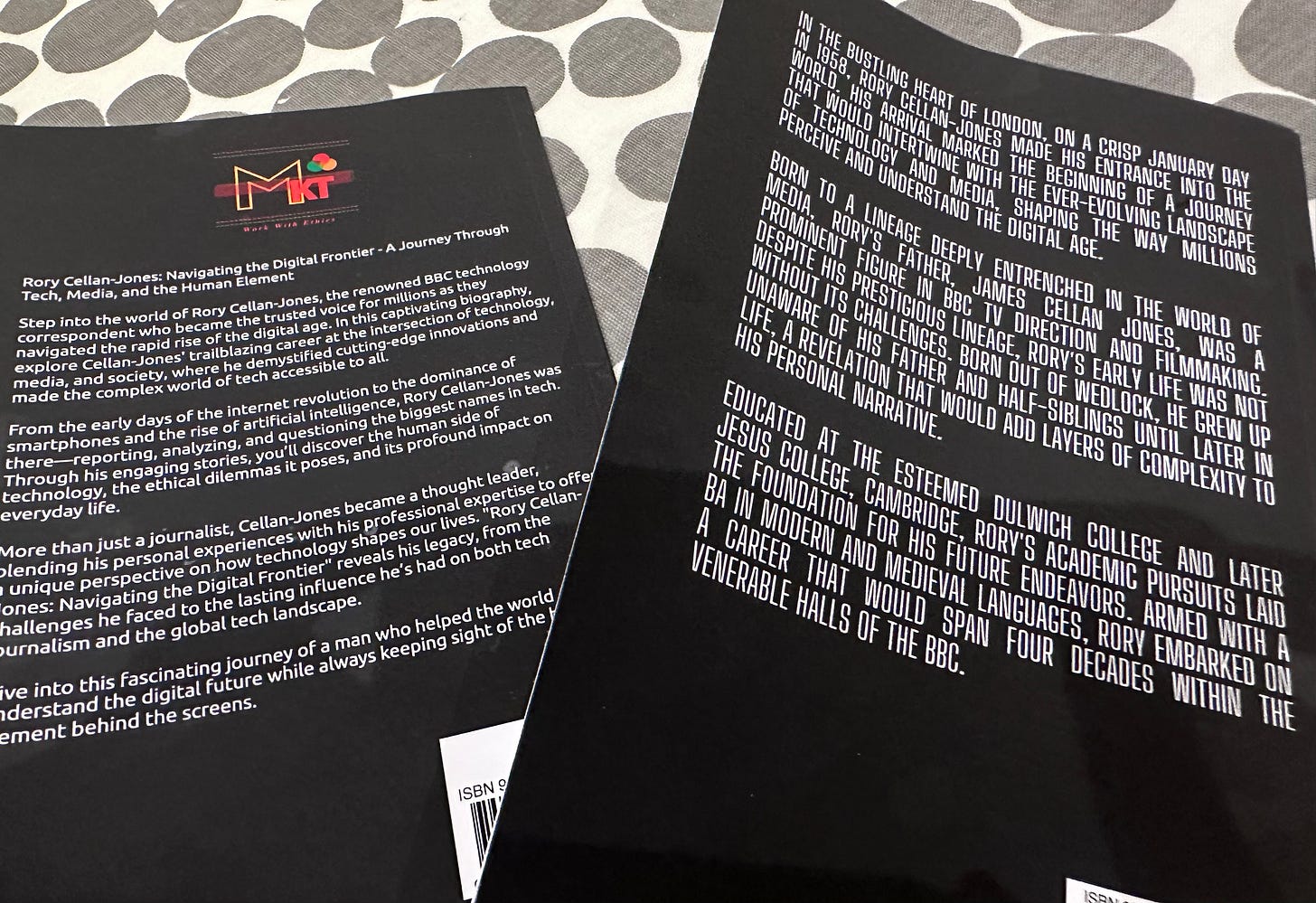The Biography Bots are Back
It is called egosurfing - checking out what a Google search for your own name throws up. But for authors with a new book coming out it is the Amazon search box where they enter their name - and they are doing it partly for practical reasons. You are warned that as publication day nears there is a danger your name can be hijacked to promote other products than your latest masterpiece.
And so it was that I found this week two biographies of someone who really doesn’t merit one - me. The first was called Rory Cellan-Jones:The Biography, the other, bizarrely, RORY CELLAN-JONES BOOK OF BIOGRAPHY, Navigating the Digital Frontier - A Journey Through Tech, Media and the Human Element.
Last year, around the time my memoir Ruskin Park was published I spotted what appeared to be an AI-generated biography of me. The content of the short e-book was both extraordinarily dull and laughably inaccurate - the biography painted a picture of my home life with two academic parents “notable in their own right for the intellectual curiosity that permeated their household”. Ruskin Park, on the other hand told of a lonely childhood with an increasingly eccentric mother and an absent father who I only met as an adult. Once alerted, Amazon quickly withdrew the product, not because it may have been AI-generated but because it was classified as a poor quality product, failing to deliver what it promised.
But this year I have two biographers and as well as selling ebooks their authors were offering my life in paperback form. Curious to see whether the biog bots had made much progress over the last year, I splashed out and ordered both. Then I rang Amazon which promptly threw the books off the platform for failing to meet quality standards. But by then my two paperbacks had sneaked out of the warehouse and on to delivery vans.
So what did I find? Has the AI advanced in a year to produce a more credible product? Well, a little. The RORY CELLAN-JONES BOOK OF BIOGRAPHY came through my letterbox first. It still seemed to have missed the fact that my father had been absent through my childhood, claiming his “contributions to British television provided Rory with personal knowledge of the media industry from a young age.” But unlike last year’s effort this biog bot does appear to have ingested at least some of Wikipedia and a few cuttings about my career.
The book makes some rather strong claims for my perspicacity about the advance of technology. So far-sighted indeed that I saw the rise of the personal computer coming in the 1980s, long before I became a technology reporter:
“Companies such as Apple and IBM were introducing personal computers that promised to make computing accessible to the average person. Rory was one of the first to notice the revolutionary power of this shift.” What a genius.
Overall however the book (or rather pamphlet - it is only 84 pages) is mind crushingly dull, reading like the homework of a capable but lazy 14 year old who has asked ChatGPT to do his “write a biography” assignment. Which could be exactly what happened here….
The next day an even slimmer package arrived containing Rory Cellan-Jones:The Biography, and this was on a whole new level of weirdness. The cover featured a photograph of….well, not me, but perhaps the result of asking an AI image generator for a picture of an ageing, balding technology reporter.
Inside, things looked a little more promising at first in that this biog bot has read (and quotes) the line from my Wikipedia entry about me being “born out of wedlock” so is a little bit more accurate about my childhood. It then races through my BBC career which “was marked by a relentless pursuit of truth and insight” chronicling the “ever-shifting landscape of cyberspace with a keen eye and unwavering dedication.”
Very quickly we are right up to date with me writing a book about our rescue dog Sophie from Romania. Indeed into the future with the book getting great reviews so that its success “opens new avenues for Rory, not just as an author but as an advocate for rescue animals and mental health awareness.”
And this is where things get very strange indeed. The rest of the book - fully half of its forty (very) odd pages consists of syrupy descriptions of my new life sitting at home writing, pursuing a mission that sounds more like that of a spiritual guru than a jobbing hack:
“With each passing day, Rory’s journey unfolds like the pages of a captivating novel, filled with unexpected twist and turns, triumphs and setbacks.”
I write with a pen, apparently, and variations of the same phrase keep repeating:
“And so with pen in hand and heart aglow Rory Cellan-Jones continues to weave tales that touch the soul…..”
“With pen in hand and heart ablaze ..”
“And so, with pen in hand and heart open wide, Rory continues to write – to write of love and loss, of hope and despair, of all the myriad emotions that make us human .”
It is as if the biog bot has got a bug, sending it into an endless loop of blether. Finally it ends “under the gentle gaze of the moon” with Rory’s writing a testament to “the boundless creativity of the human mind. With each tale he shares, he leaves a mark upon the world, a legacy that will echo through the ages, inspiring generations yet to come.”
While no author is named on the book, the Amazon listing had this as one of a number of biographies written by a Yahia Belkherouf, including profiles of far more likely subjects such as Taylor Swift, Pope Francis and Richard Branson. All of them have now been taken off the site by Amazon. The online retailer is hoping that a new scheme where it is asking users of its Kindle Direct Publishing platform to go through an identity verification process will make these kind of fake biographies far less common.
But the experience of reading these two books has left me wondering whether the threat posed by AI to creative artists - or at least those who make a living through the written word - has been overblown. Even though the cost of producing these dubious books may be low, it is not zero - just the task of working out what questions to ask a Large Language Model requires a certain expertise. And then there is the question of who will actually pay for what are extremely unattractive products. Amazon will not release any sales figures for my two biographies but I would be surprised if either had made it into double figures. So I am not convinced there is much of a business model for AI books.
And consider this. Prada makes handbags which it sells at a hefty margin over the cost of production because of the allure of its brand. Craig Brown writes extremely entertaining and original biographies of people ranging from Princess Margaret to the Beatles and the Queen. It is relatively easy to create a convincing replica of a Prada handbag which might fool most shoppers but while ChatGPT could knock you out a Beatles or Princess Margaret biography pretty swiftly, nobody would ever confuse one with a Craig Brown book.
If you are a writer of formulaic books devoid of originality, it might be time to start thinking about a new profession - those can be left to AI. If you are Craig Brown, I would relax…




Having been written by bots do those fake biographies make them auto-biographies? They certainly sound artificial with little intelligence applied.
Fortunately these books are only printed on demand. Not only has Microsoft purchased Three Mile Island to run forty 20 megawatt datacenters, but AI is consuming the world's trees and water.